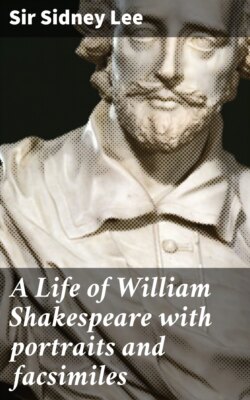Читать книгу A Life of William Shakespeare with portraits and facsimiles - Sir Sidney Lee - Страница 40
На сайте Литреса книга снята с продажи.
The London theatres.
ОглавлениеTable of Contents
When Shakespeare became a member of the company it was doubtless performing at The Theatre, the playhouse in Shoreditch which James Burbage, the father of the great actor, Richard Burbage, had constructed in 1576; it abutted on the Finsbury Fields, and stood outside the City’s boundaries. The only other London playhouse then in existence—the Curtain in Moorfields—was near at hand; its name survives in Curtain Road, Shoreditch. But at an early date in his acting career Shakespeare’s company sought and found new quarters. While known as Lord Strange’s men, they opened on February 19, 1592, a third London theatre, called the Rose, which Philip Henslowe, the speculative theatrical manager, had erected on the Bankside, Southwark. At the date of the inauguration of the Rose Theatre Shakespeare’s company was temporarily allied with another company, the Admiral’s men, who numbered the great actor Edward Alleyn among them. Alleyn for a few months undertook the direction of the amalgamated companies, but they quickly parted, and no further opportunity was offered Shakespeare of enjoying professional relations with Alleyn. The Rose Theatre was doubtless the earliest scene of Shakespeare’s pronounced successes alike as actor and dramatist. Subsequently for a short time in 1594 he frequented the stage of another new theatre at Newington Butts, and between 1595 and 1599 the older stages of the Curtain and of The Theatre in Shoreditch. The Curtain remained open till the Civil Wars, although its vogue after 1600 was eclipsed by that of younger rivals. In 1599 Richard Burbage and his brother Cuthbert demolished the old building of The Theatre and built, mainly out of the materials of the dismantled fabric, the famous theatre called the Globe on the Bankside. It was octagonal in shape, and built of wood, and doubtless Shakespeare described it (rather than the Curtain) as ‘this wooden O’ in the opening chorus of ‘Henry V’ (1. 13). After 1599 the Globe was mainly occupied by Shakespeare’s company, and in its profits he acquired an important share. From the date of its inauguration until the poet’s retirement, the Globe—which quickly won the first place among London theatres—seems to have been the sole playhouse with which Shakespeare was professionally associated. The equally familiar Blackfriars Theatre, which was created out of a dwelling-house by James Burbage, the actor’s father, at the end of 1596, was for many years afterwards leased out to the company of boy-actors known as ‘the Queen’s Children of the Chapel;’ it was not occupied by Shakespeare’s company until December 1609 or January 1610, when his acting days were nearing their end. [38a]
